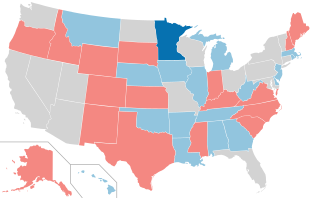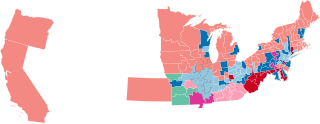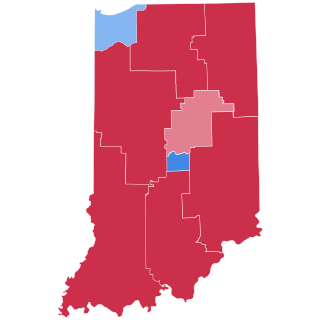Related Research Articles

Peter John Visclosky is an American politician who served as the U.S. representative for Indiana's 1st congressional district from 1985 until his retirement in 2021. He is a member of the Democratic Party and was the dean of the Indiana congressional delegation before his retirement in 2021. The District lies in Northwest Indiana, and includes most of the Indiana side of the Chicago metropolitan area. Redistricting passed by the Indiana General Assembly in 2011 changed the district's boundaries, effective January 2013, to include all of Lake and Porter counties as well as the western and northwestern townships of LaPorte County, while shifting Benton, Newton, and Jasper counties out of the district.

The 1990 United States Senate elections were held on Tuesday, November 6, 1990, with the 33 seats of Class 2 contested in regular elections. Special elections were also held to fill vacancies. The Democratic Party increased its majority with a net gain of one seat from the Republican Party. The election cycle took place in the middle of President George H. W. Bush's term, and as with most other midterm elections, the party not holding the presidency gained seats in Congress. This was the first time since 1980 that any party successfully defended all their own seats, and the first time Democrats did so since 1958.

The 1982 United States Senate elections were held on November 2, 1982. They were elections for the United States Senate following Republican gains in 1980. The 33 Senate seats of Class 1 were up for election in 1982. A total of four seats changed hands between parties, with Democrats winning seats in New Jersey and New Mexico, and Republicans taking seats in Nevada and the seat of the lone independent, Senator Harry Byrd Jr., in Virginia. Democrats made a net gain of one seat bringing them to 46 seats, while Republicans stayed at 54 seats for a majority. However, the Democratic gain in New Jersey replaced a Republican that had been appointed earlier in the year. Liberal Republicans senators in Connecticut, Rhode Island and Vermont held onto their seats, keeping the Senate in Republican hands.

The 1976 United States Senate elections was an election for the United States Senate. Held on November 2, the 33 seats of Class 1 were contested in regular elections. They coincided with Democrat Jimmy Carter's presidential election and the United States Bicentennial celebration. Although almost half of the seats decided in this election changed parties, Carter's narrow victory did not provide coattails for the Democratic Party. Each party flipped seven Senate seats, although, one of the seats flipped by Democrats was previously held by a Conservative.

The 1958 United States Senate elections were elections for the United States Senate which occurred in the middle of President Dwight D. Eisenhower's second term. Thirty-two seats of Class 1 were contested in regular elections, the new state of Alaska held its first Senate elections for its Class 2 and 3 seats, and two special elections were held to fill vacancies.

The 1942 United States House of Representatives elections were elections for the United States House of Representatives to elect members to serve in the 78th United States Congress. They were held for the most part on November 3, 1942, while Maine held theirs on September 14. This was the first election after the congressional reapportionment based on the 1940 census, and was held in the middle of President Franklin D. Roosevelt's third term. With involvement in World War II, it was the first wartime election in the United States since 1918.

The 1872–73 United States House of Representatives elections were held on various dates in various states between June 4, 1872, and April 7, 1873. Each state set its own date for its elections to the House of Representatives before the first session of the 43rd United States Congress convened on December 1, 1873. They coincided with the re-election of United States President Ulysses S. Grant. The congressional reapportionment based on the 1870 United States census increased the number of House seats to 292.

The 1862–63 United States House of Representatives elections were held on various dates in various states between June 2, 1862, and November 3, 1863, during the American Civil War and President Abraham Lincoln's first term. Each state set its own date for its elections to the House of Representatives before the first session of the 38th United States Congress convened on December 7, 1863. The congressional reapportionment based on the 1860 United States census was performed assuming the seceded states were still in the union, increasing the number of congressional districts to 241. West Virginia was given three seats from Virginia after the former broke away from the latter to rejoin the union as a separate state. The seceded states remained unrepresented and left 58 vacancies. Republicans lost 22 seats and the majority, while Democrats gained 28.

The 1916 United States Senate elections were elections that coincided with the re-election of President Woodrow Wilson. This was the first election since the enactment of the Seventeenth Amendment that all 32 Class 1 senators were selected by direct or popular elections instead of state legislatures. Republicans gained a net of two seats from the Democrats, and then an additional two seats through mid-term vacancies thereby reducing Democrats to a 52–44 majority.

Daniel Schaefer was an American politician who served as the U.S. representative for Colorado's 6th congressional district from 1983 to 1999.

The 2006 congressional elections in Indiana were elections for Indiana's delegation to the United States House of Representatives, which occurred along with congressional elections nationwide on November 7, 2006. Indiana played an important role in helping Democrats sweep Congress, when three Republican incumbents were defeated, giving the Democrats a majority of the delegation again. Republicans held a majority of Indiana's delegation, 7–2, before the elections.

The 2010 congressional elections in Indiana were held on November 2, 2010, to determine who would represent the state of Indiana in the United States House of Representatives. Representatives are elected for two-year terms; those elected served in the 112th Congress from January 2011 until January 2013, except for the winner of the 3rd District's special election, who will serve the few remaining weeks of the 111th Congress. As of 2023 this is the last time that the Democrats won more than 2 seats in Indianas house delegation.

The 2012 United States House of Representatives elections in Indiana were held on Tuesday, November 6, 2012, to elect the nine U.S. representatives from the state, one from each of the state's nine congressional districts. The elections coincided with the elections of other federal and state offices, including a quadrennial presidential election, an election to the U.S. Senate, and a gubernatorial election.

Susan Lynn Brooks is an American prosecutor and politician. She is a Republican and the former U.S. Representative for Indiana's 5th congressional district. She was elected in 2012. The district includes the northern fifth of Indianapolis, as well as many of the city's affluent northern and eastern suburbs. Brooks served as the United States Attorney for the Southern District of Indiana from 2001 to 2007.

The 1916 United States Senate election in Indiana took place on November 7, 1916. Incumbent Democratic U.S. senator and Senate Majority Leader John W. Kern ran for re-election to a second term in office, he was defeated by Republican Harry New, a former chairman of the Republican National Committee.

The 2020 Indiana gubernatorial election was won by incumbent Republican Eric Holcomb on November 3, 2020. The election was held concurrently with the 2020 U.S. presidential election, as well as elections to the United States House of Representatives and various state and local elections.
Mike Speedy is a Republican former member of the Indiana House of Representatives representing the 90th district from 2010 to 2024. He previously served as an Indianapolis City Councilman for the 24th district from 2004 to 2010. The American Conservative Union has given him a lifetime Legislature score of 90%. He earned a BS from the Kelley School of Business and a JD from the Indiana University Robert H. McKinney School of Law. In 2024, Speedy announced he was running for the United States House of Representatives in Indiana's 6th congressional district after Greg Pence announced he would not seek re-election. He lost the primary election to former Indianapolis city councilor Jefferson Shreve.

The 2020 United States House of Representatives elections in Indiana were held on November 3, 2020, to elect the nine U.S. representatives from the state of Indiana, one from each of the state's nine congressional districts. The elections coincided with the 2020 U.S. presidential election, as well as other elections to the House of Representatives, elections to the United States Senate and various state and local elections.

The 2022 United States House of Representatives elections in Indiana were held on November 8, 2022, to elect the nine U.S. representatives from the state of Indiana, one from each of the state's nine congressional districts. The elections coincided with other elections to the U.S. House of Representatives, elections to the U.S. Senate, and various state and local elections. Primary elections took place on May 3.
Scott Baldwin is an American politician, businessman, and law enforcement officer who is a member of the Indiana Senate from the 20th district. He assumed office on November 18, 2020, succeeding Victoria Spartz.
References
- ↑ "List of All Offices and Office Holders". 5 March 2015.
- ↑ Midwestern Legislative Conference Officers.
- ↑ http://reske.indianahousedemocrats.org/bio [ dead link ]
- ↑ "Our Campaigns - IN State House 037 Race - Nov 05, 2002".
- ↑ "Our Campaigns - IN State House 037 Race - Nov 02, 2004".
- ↑ "Our Campaigns - IN State House 037 Race - Nov 07, 2006".
- ↑ "Our Campaigns - IN State House 037 Race - Nov 04, 2008".
- ↑ "Our Campaigns - IN State House 037 Race - Nov 02, 2010".
- ↑ "The Rochester Sentinel - Google News Archive Search".
- ↑ "Reske says Indy can't afford Pacers deal".
- ↑ "The Voter's Self Defense System".
- ↑ Schneider, Mary Beth (September 30, 2011). "State Rep. Reske plans run for Burton's seat in Congress". The Indianapolis Star . Retrieved October 3, 2011.
- ↑ "Official Scott Reske for United States Congress". Archived from the original on 2012-04-25. Retrieved 2011-11-14., Official biography – Campaign website.